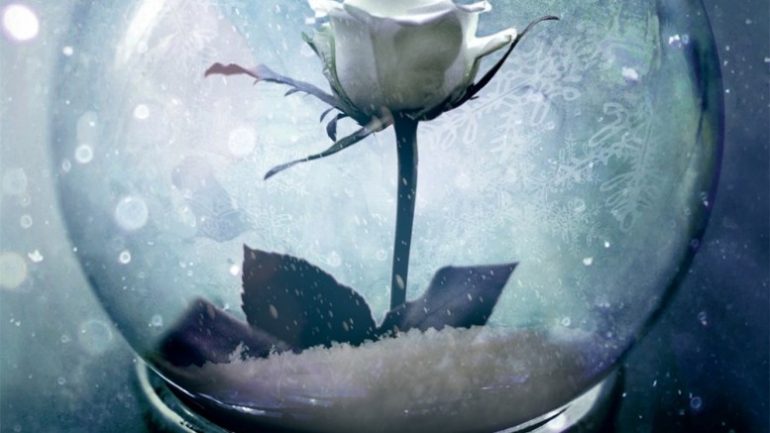
Wintersong
Author: S. Jae-Jones
Genre: Young Adult
Publisher: Thomas Dunne Books
Review by CL Vitek
“I am the Lord of Mischief, the Ruler Underground,” he said, mismatched eyes glinting. “I am wildness and madness made flesh. You’re just a girl”—he smiled, and the tips of his teeth were sharp—“and I am the wolf in the woods.”
 The 2017 debut novel from S. Jae-Jones, Wintersong, is a dark fantasy YA tale full of romance and music. The heroine, Liesel, has grown up enchanted with the myths of the Goblin King, Der Erlkönig, and his otherworldly role in the turning of the seasons. As she reaches adulthood, her dreams of composing music seem impossible when confronted with the reality of hard work to help support her family. But when her younger sibling disappears and she comes face-to-face with the truth of the myths, Liesel is forced to make a choice that will lead her into a game impossible to win.
The 2017 debut novel from S. Jae-Jones, Wintersong, is a dark fantasy YA tale full of romance and music. The heroine, Liesel, has grown up enchanted with the myths of the Goblin King, Der Erlkönig, and his otherworldly role in the turning of the seasons. As she reaches adulthood, her dreams of composing music seem impossible when confronted with the reality of hard work to help support her family. But when her younger sibling disappears and she comes face-to-face with the truth of the myths, Liesel is forced to make a choice that will lead her into a game impossible to win.
I’d looked forward to reading this book for some time, anticipating a fantasy novel incorporating devious and deceitful versions of goblins and fae into historical fiction. My interest was certainly piqued by the fact that the sibling-snatching antagonist in Wintersong was The Goblin King. With that royal title, it is impossible for fans of Jim Henson’s Labyrinth (1986) not to see the similarities. The elements of that story are here: the Goblin King (down to his mismatched eyes and distinctive hair), stolen siblings, poisoned peaches, a game of chance, and the winding, labyrinthine passages of The Underground itself. The resemblance is difficult to miss, even as a book admittedly inspired by the film. These elements, while entertaining nods when used sparingly, can also be distracting when they mirror the story too closely.
The first half of the book begins Liesel’s journey into The Underground and presents an initial conflict that I found interesting and read through quickly. Unfortunately, Liesel’s part in this is resolved relatively early. At that point, the story takes a turn that shifts the it both in tone and in pacing. The narrative slows to a crawl, focusing on the growing romantic relationship instead of a greater hinted conflict with treacherous goblins or the wager between Liesel and the King. Everything I found compelling in the first half disappears and we are left only with the romantic plot. It is arguably the weakest part of the story and the one that we spend the most amount of time on
It is stated the that two main characters have an emotional link but it was not well reflected in the actual interactions they have with one another. The Goblin King doesn’t feel menacing or very mysterious though Liesel assures us he is both. At the beginning, the book establishes he enjoys wagers and playing games with mortals, yet he seems fairly forthcoming in what his goals are. This was a common occurrence in all Liesel’s relationships; many times we are told about how Liesel feels about secondary characters without seeing it revealed in their exchanges. It’s hard to get a grasp on them other than what the main character tells us herself. As slowly as the story unfolded, the romance – and the oddly paced plot surrounding it – wasn’t quite enough for me. While I’d read the story was supposedly filled with “gritty and dark romance”, I didn’t find that in this book. Instead, I found a safe retelling of myths with some outside influences.
There are echoes of the Hades/Persephone myth, Beauty and the Beast, and Orpheus’s journey through the underground mingled with tales from European folklore and Christina Rossetti’s 19th century poem The Goblin Market. The book is beautifully written and it’s clear that Jae-Jones can use language to set the stage for this story. The scenery she describes is gorgeous and offers a good look at the setting both historically and geographically, painting a picture of both worlds that is intriguing and exciting. Potential for a compelling story is all there; the book just falls short of doing something unique with the setting and inspiration.
Verdict:
While beautifully written, Wintersong’s slow pacing kept it from ever reaching more than another fairy tale for me. This book may appeal to the inner romantic in many readers, especially for those who like their romance with a slow burn and a little more explicit than typical YA fare. For me, the sexual content seems unnecessary at times and occasionally distracted from the story instead of enhancing the flow of it. As far as being a fairy tale, it did the job quite well, never forgetting the darker (and often more complicated) origins of the oldest stories we all know.
I would recommend this book for fans of the dark fantasy romances like Fallen, Wicked Lovely, or Poison Princess. It contains a lot of fun elements that I hope to see explored by the author in future works. I would certainly read another book by her in the future.
It is important to keep in mind that Wintersong is part of a duology; the second chapter – Shadowsong – is releasing in early February 2018. Because of this, the book ending feels abrupt, reintroducing story elements largely abandoned earlier just when we were sure they weren’t. There are a lot of loose ends to be answered in the second book and still much of the world left to explore.


![[REVIEW] KANG THE CONQUEROR #1](https://geekd-out.com/wp-content/uploads/2021/08/kang-1-feat-150x150.png)
![[PODCAST] THE COMICS AGENDA: WHAT WOULD YOU LIKE TO EAT?](https://geekd-out.com/wp-content/uploads/2017/11/comics-agenda-2-150x150.jpg)